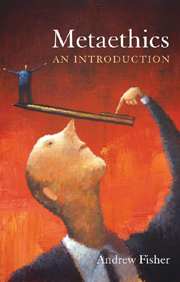Book contents
- Frontmatter
- Contents
- Preface
- Introduction
- 1 The open question argument
- 2 Emotivism
- 3 Error theory
- 4 Moral realism and naturalism
- 5 Moral realism and non-naturalism
- 6 Quasi-realism
- 7 Moral relativism
- 8 Moral psychology
- 9 Moral epistemology
- 10 Fictionalism and non-descriptive cognitivism
- Questions
- Glossary
- References
- Index
7 - Moral relativism
- Frontmatter
- Contents
- Preface
- Introduction
- 1 The open question argument
- 2 Emotivism
- 3 Error theory
- 4 Moral realism and naturalism
- 5 Moral realism and non-naturalism
- 6 Quasi-realism
- 7 Moral relativism
- 8 Moral psychology
- 9 Moral epistemology
- 10 Fictionalism and non-descriptive cognitivism
- Questions
- Glossary
- References
- Index
Summary
[Relativism is] possibly the most absurd view to have been advanced even in moral philosophy.
(Williams 1972: 34)The aim of most philosophical discussions of relativism is to establish its manifest falsity.
(Wong 2006: xi)I have always been a moral relativist. As far back as I can remember thinking about it, it has always seemed to me obvious that the dictates of morality arise from some sort of convention or understandings, and that there are no basic moral demands that apply to everyone. For many years this seemed so obvious to me that I assumed it was everyone's instinctive view, at least everyone who gave the matter any thought.
(Harman 2000: 77)CHAPTER AIMS
To outline speaker and agent relativism and distinguish between them.
To outline the motivations for relativism.
To pose a problem for both speaker and agent relativism.
To show how issues relating to relativism are also related to discussions of meaning, truth and external reasons.
Introduction
Relativism could do with a good spin-doctor. In philosophical discussions if you can show your opponent holds a relativist position then you have as good as won. Calling someone a “relativist” is rarely a compliment and even professional philosophers tend to write as if being able to demonstrate that a position leads to relativism is enough to question the truth of that position. This is unfair. “Relativism” covers a multitude of sophisticated and widely defended positions and although we cannot consider them all, we shall discuss two: speaker relativism and agent relativism.
- Type
- Chapter
- Information
- MetaethicsAn Introduction, pp. 111 - 126Publisher: Acumen PublishingPrint publication year: 2011



